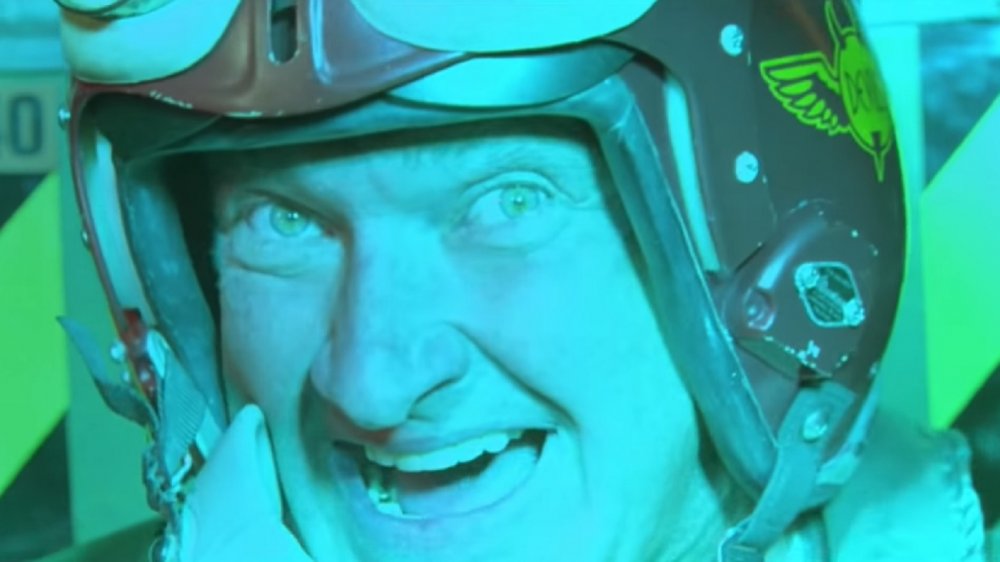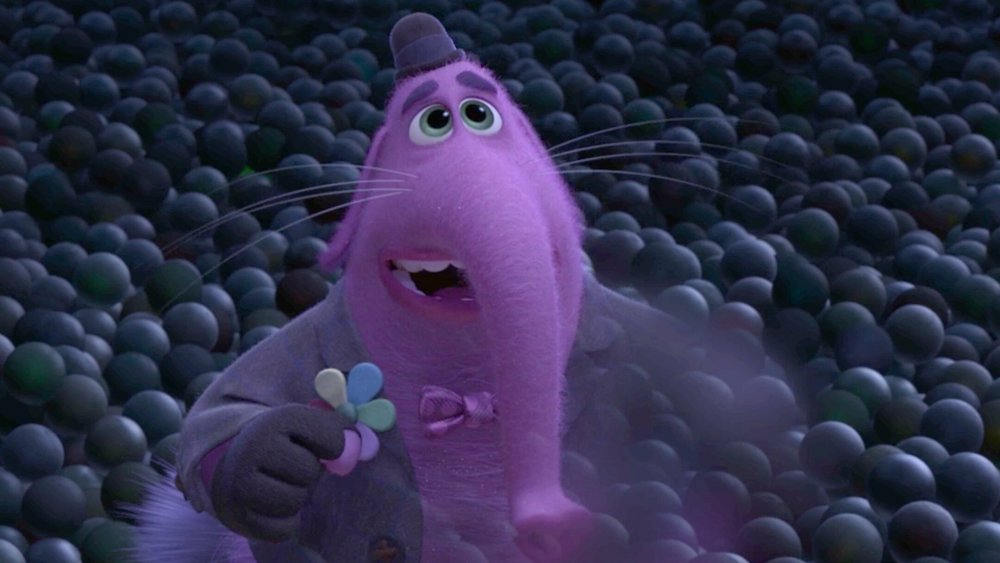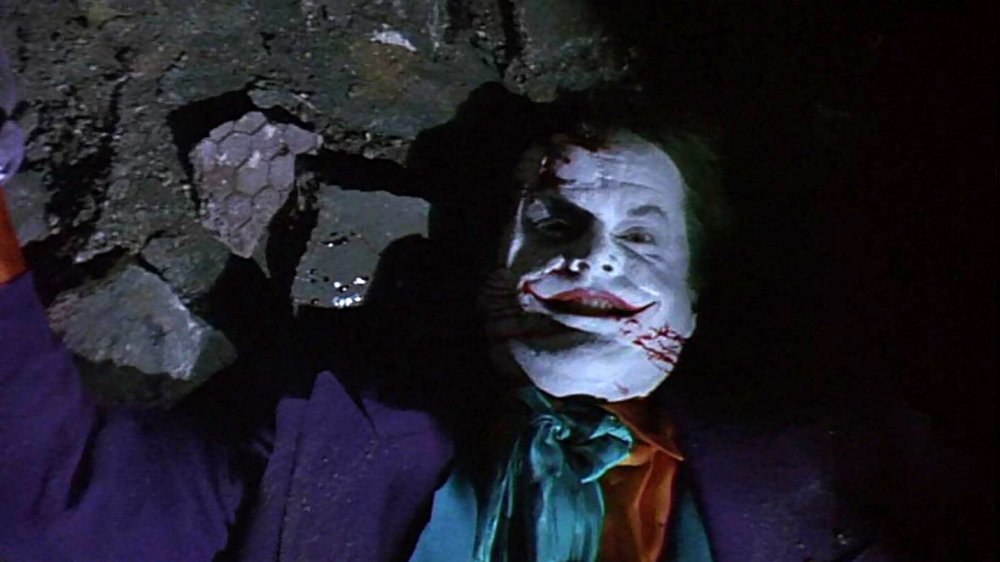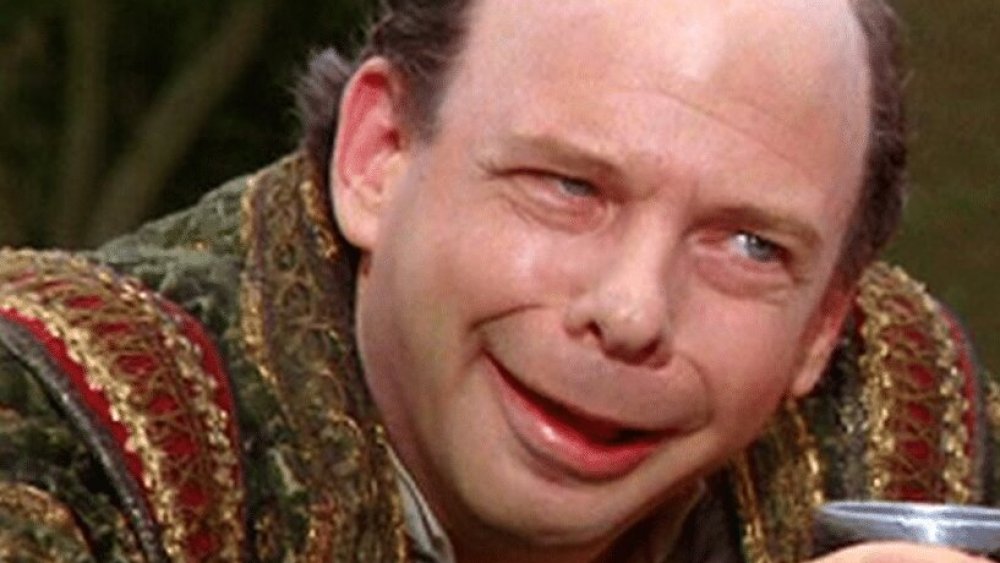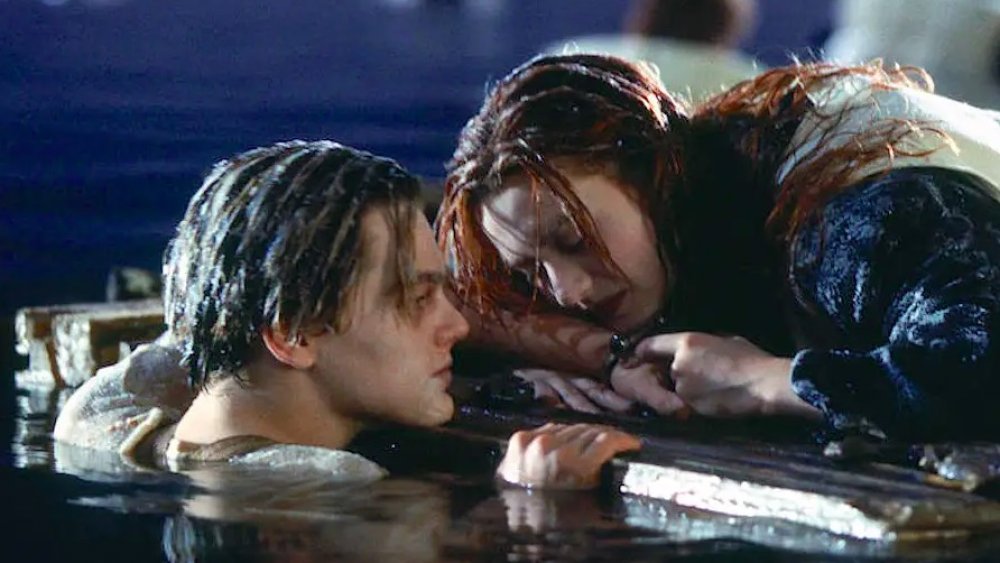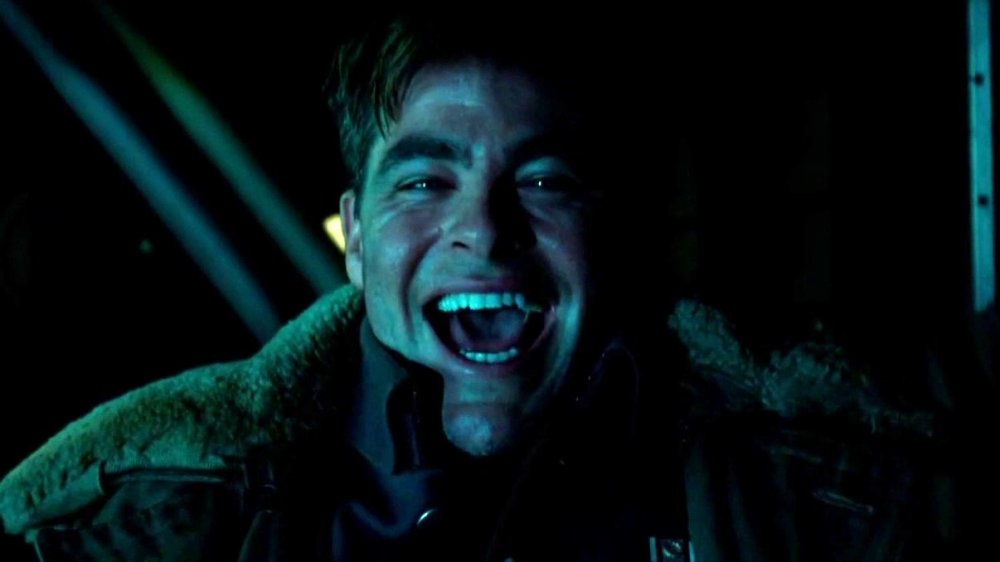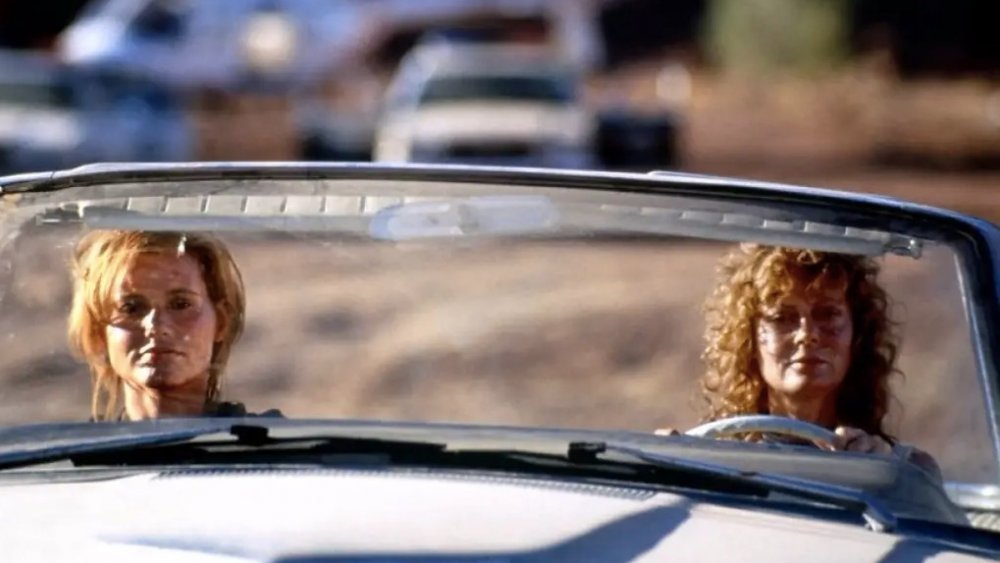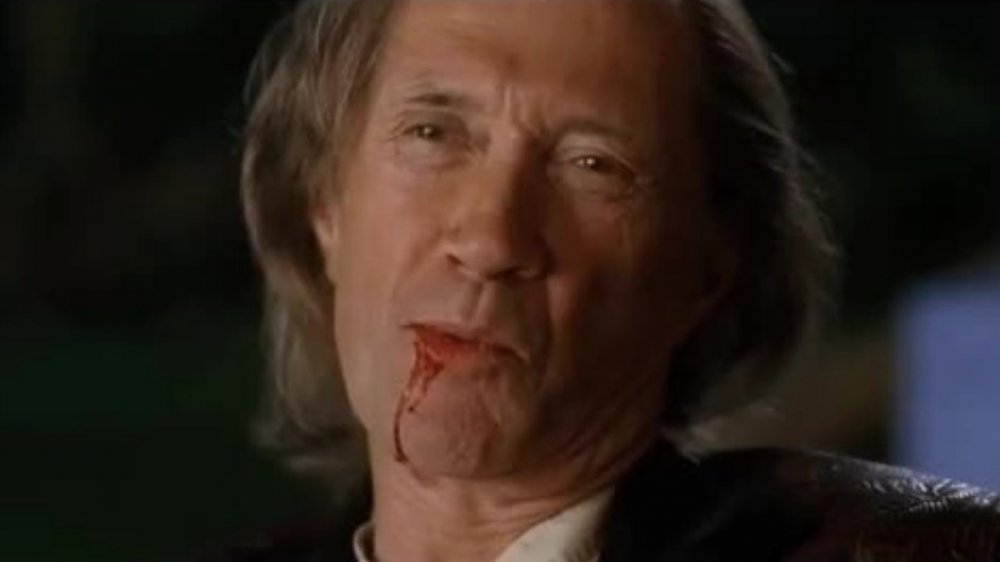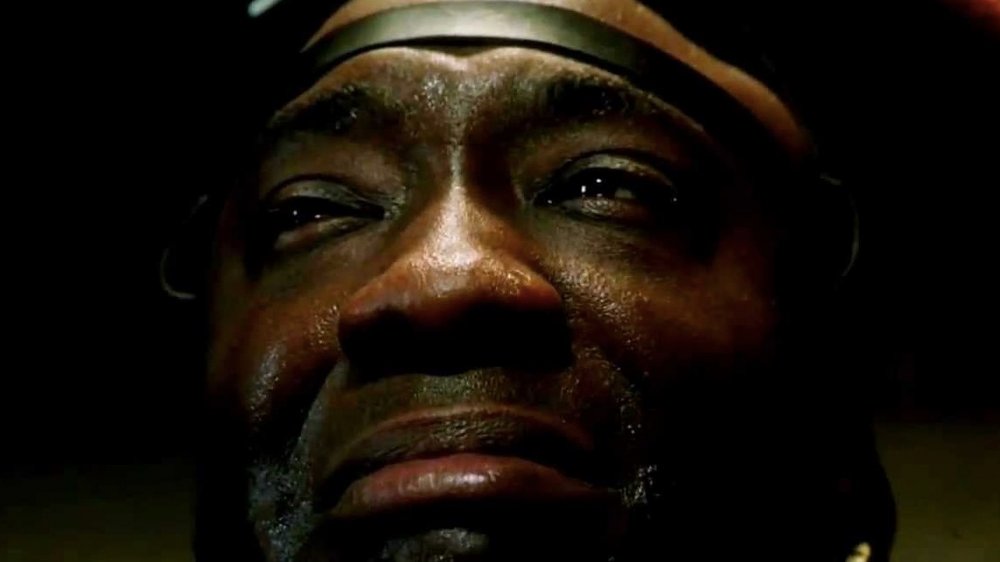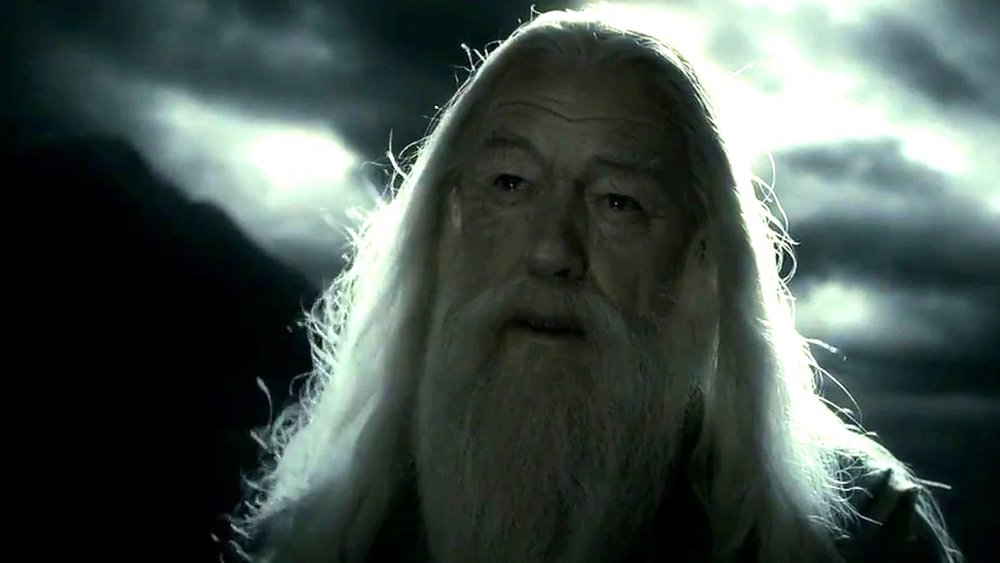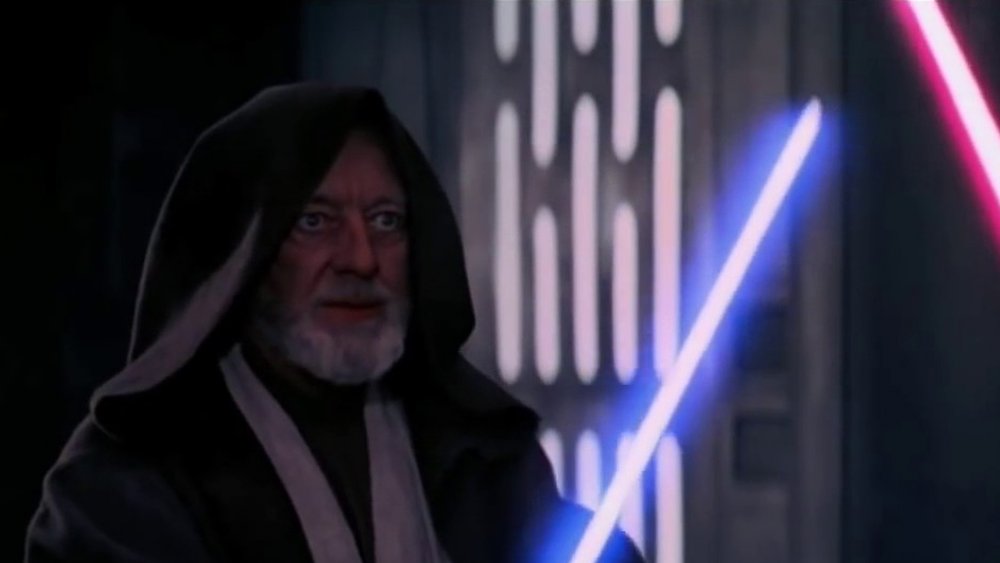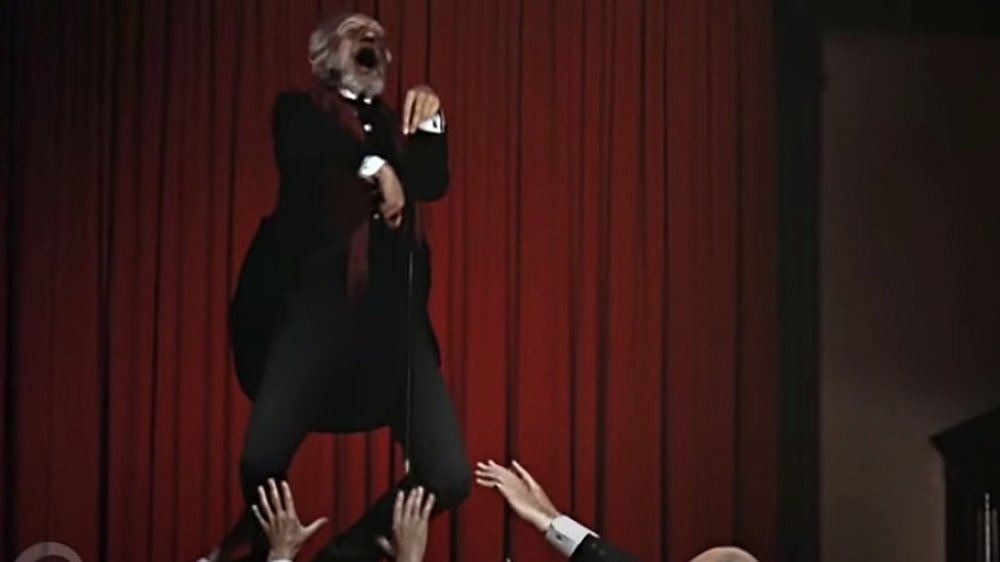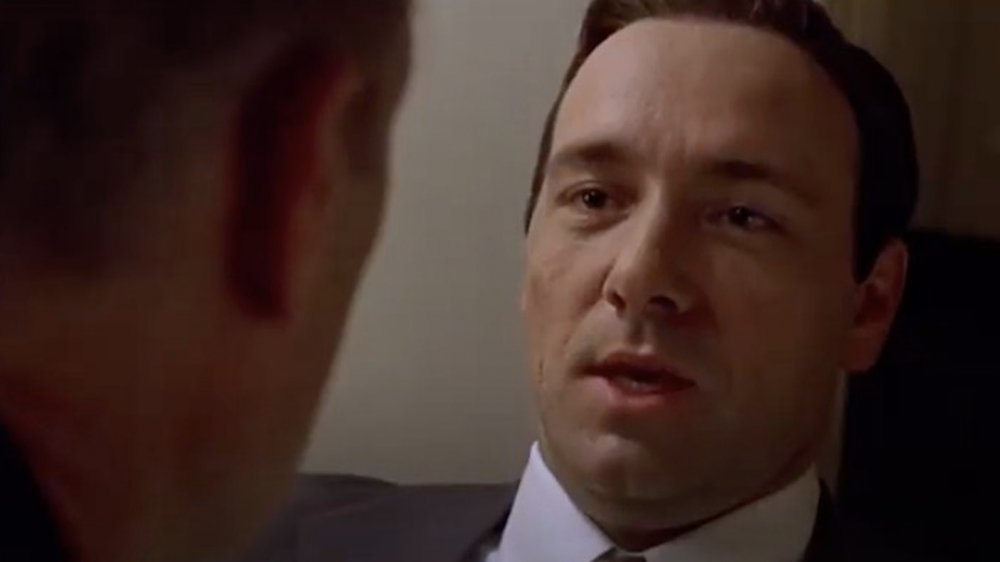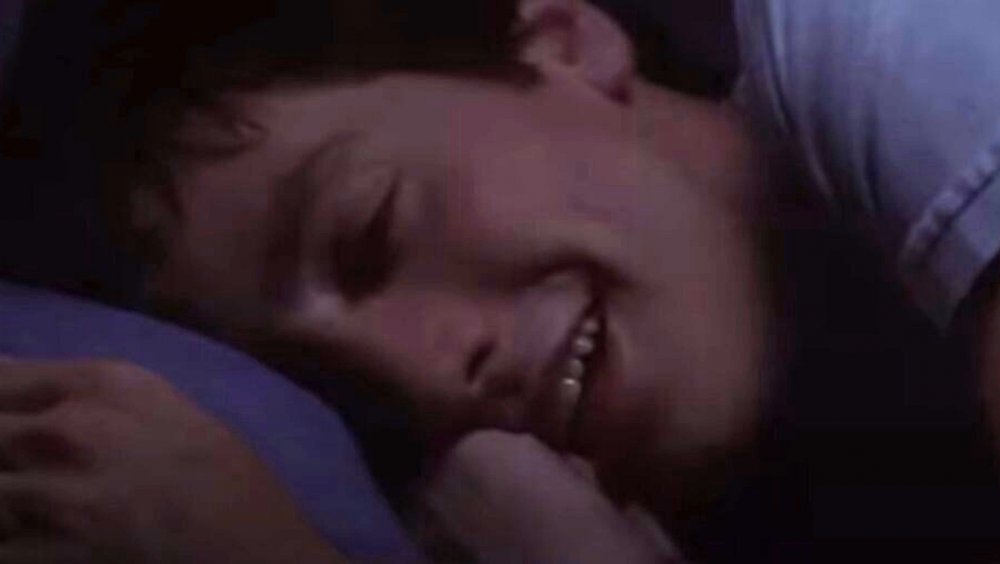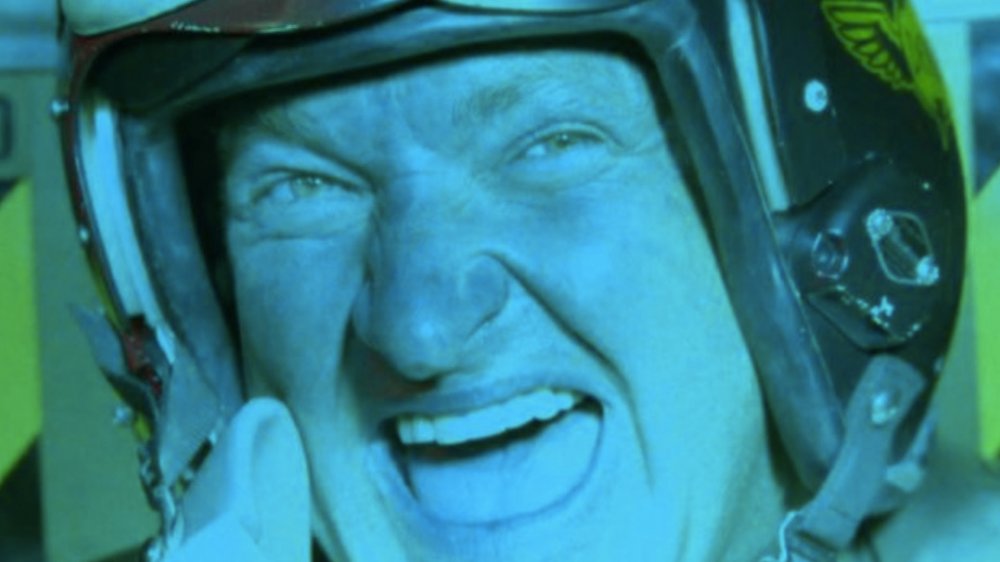Why These Movie Characters Smiled Right Before They Died
The question of what you would do with your last breath is a compelling one, but of the answers we might come up with, it's unlikely that smiling is at the top of the list. Nevertheless, for one reason or another, some movie characters end up doing exactly that.
Some of them realized they were about to die, and their smiles were brought on by contented reflections of their life or the knowledge that their sacrifice would be worth it. Others laughed because they mistakenly believed they'd bested someone who was, in fact, about to triumph over them. And one character from an iconic film literally died of laughter.
Whatever the reason, a character's departing expression says a lot about who they were and the stories in which they played their final roles. Whether disturbing, beautiful, or something else altogether, these dying smiles cemented the legacies of those who offered them.
(Be warned — spoilers follow.)
Bing Bong smiles right before fading away
Inside Out famously left audiences of all ages in tears. The story centers around a young girl named Riley, who's struggling to adjust after a big move. She's in the midst of new and increasingly complicated feelings that come with getting older, and inside her head, the personifications of Joy and Sadness are on a quest to restore some semblance of order. And during their journey, Joy and Sadness come across Bing Bong, Riley's childhood imaginary friend.
As the trio try to heal the emotional wounds that threaten to overwhelm Riley, Joy and Bing Bong end up in the Memory Dump, a canyon of forgotten memories that are eventually erased forever. Desperate, the two try to escape on Bing Bong's wagon, which propels itself with rainbows and is fueled by song and belief. Joy and Bing Bong take care of the singing, but Riley has lost touch with her faith and imagination, and the wagon can't make it to the top. Bing Bong realizes that without his weight, the wagon will go the distance, and he sacrifices himself. This means that Riley will forget about him, but as Joy flies to freedom, he smiles because he knows Riley will grow up with the emotional health to make so many more wonderful memories.
The Joker goes out with a grin
Tim Burton's films are often dark, but they all have his trademark whimsical humor. The combination is often surreal, and his 1989 take on Batman is no exception, right down to the death of the Joker. The fusion of gothic sensibilities with a certain sense of wonder feels just a little demented, making Burton's filmmaking style a great medium through which to portray this particular, famously out-of-his-mind villain.
Speaking of gothic, the Joker dies on the steps of a cathedral after Batman tethers him to a gargoyle that later plummets to the ground. Before his demise, he dances happily while waiting for his helicopter above the ledge where Batman and Vicki Vale dangle helplessly. Laughing at them, he remarks, "Sometimes, I just kill myself!"
Of course, he's referring to the way one might say "you're killing me" as in response to a good joke (in this case, the joke is that Batman is going to die). But really, it's his own helicopter that tugs him and the gargoyle free from the ledge, so he truly is responsible for his own death. But even in his final moments, he remains psychotic and smiling.
Vizzini thinks he has the last laugh
Released in 1987, The Princess Bride introduced audiences to a conniving villain by the name of Vizzini, a genius-level thug who kidnaps Princess Buttercup and draws the ire of the Dread Pirate Roberts — a buccaneer who's secretly Buttercup's long-lost lover, Westley, in disguise. And after Vizzini decides to throw down with the black-clad hero, it gives way to one of the funniest deaths in cinematic history.
Westley and Vizzini engage in a "battle of wits," in which the latter must choose between two goblets, knowing Westley has poisoned one. He switches the goblets when Westley's back is turned, believing that Westley now has the lethal cup. In reality, Westley has prepared for this moment by poisoning himself for so long that he's become immune to the toxin. And as it turns out, he's contaminated both cups.
As smart as Vizzini thinks he is, he never would've imagined that his enemy would poison himself. He dies laughing, reveling in his perceived triumph, with no idea that it was the body, not the mind, that would decide this battle. Ignorance is bliss.
Jack comforted Rose in his final moments
Titanic introduced us to the king of the world himself, Jack Dawson. He's a working-class rogue who falls for the aristocratic Rose, and by the end of the film, he's totally stolen her heart (not to mention the audience's). However, when the titular ship crashes into that iceberg, it sends our lovestruck heroes plummeting into the ocean, and from there, things get sad and... smiley?
As Rose floats above the water on a wooden door, Jack is half-submerged at her side. There's apparently nothing else for him to grab onto, and the two realize this is goodbye. Jack pleads with Rose to never give up, no matter what. If she can just stay afloat, help will come, and her life will go on, leading to happiness even after he's gone. Jack then falls unconscious due to hypothermia and never wakes up, but one of the last things he does before dying is smile at the woman he loves. Some say you see your life flash before your eyes in your last moments, but it seems like Jack saw Rose's instead.
Steve Trevor leaves Wonder Woman with a wonderful smile
Smiles that precede sacrifice often come from recognizing a bigger cause than one's own survival. Sometimes, it's the survival of a loved one. Other times, it's the survival of many. In Steve Trevor's case, it's both. His love is the titular hero in 2017's Wonder Woman, who tasks herself with confronting Ares. The god of war threatens to destroy humanity with World War I, and this includes manipulating an evil scientist who's engineered a new form of mustard gas. In his final sacrifice, Steve flies a plane containing this poison to a safe altitude before it's scheduled to detonate, destroying the poison and himself in the process.
"I can save today," he tells Diana as he says goodbye, "you can save the world." He offers up his own life because he loves her, but he also demonstrates a love for all of humanity. He was right that Wonder Woman was the one who could save the world, but the fact that she did was only as a direct result of his sacrifice. Steve became living, dying proof of what she'd doubted — that humans have goodness and love in them and are therefore worth saving. Steve smiled, in the end, because he knew he had given love a second chance to prevail, in Diana's heart and the world.
Thelma and Louise both smile as they go soaring
The stunning climax of Thelma and Louise is one of the most triumphant moments in modern cinema, even though the two main characters die. After murdering a man who sexually assaulted Thelma, the two heroes go on the run and wreak violent havoc on the abusive men they encounter. But eventually, the pair find themselves with nowhere to run, boxed in on one side by law enforcement and a yawning canyon on the other. But this isn't the first time they've been cornered. Their first prisons were their marriages and the cookie-cutter roles those unions demanded.
It seems their only option is to surrender, which will land them in actual prison, but in the course of their adventures, Thelma and Louise have learned that they don't have to conform to anyone's expectations. And what could defy expectation more than suggesting that they "keep going" until they reach the limitations not of gender but of physics? As they aim their car for the cliff and go flying into the canyon below, Thelma and Louise smile at each other because they're no longer running away. They're running toward the real boundaries of the possible, not the ones they were conditioned to accept.
Bill greeted death with a grin
Despite giving his film the title of Kill Bill: Vol. 2, writer-director Quentin Tarantino kept audiences guessing as to whether Uma Thurman's vengeful Beatrix "The Bride" Kiddo would take her former lover and longtime enemy to meet his maker for the massacre he committed at her wedding. When she finally vanquishes him, he smiles after she delivers the final blow, and he has many reasons. He's made peace with her. He has a daughter. He's mourned Beatrix, then tried to kill her, and is now dying at her hands. The ending is as poetic as each deserves.
Bill isn't the only one who greets his death with a degree of good humor. Beatrix does, as well, even if it's artificial. Bill didn't want her daughter to see her in tears, so when she mourns him the next day, the lingering effects of the truth serum she's been administered muddle her tears with uncontrollable laughter. Bill knew, or perhaps hoped, that she would need to cry because she still loved him, and perhaps this is the ultimate reason for his smile. Despite their horrific history, he died still loving her, too.
John Coffey must've felt relief in his final moments
It makes a lot of sense that The Green Mile's John Coffey — a savior figure who shares the initials and miraculous healing abilities of Jesus Christ — would have an uncommon take on death. His expression is strained as he waits, wrongly convicted, in the electric chair to be executed for the rape and murder of two young girls. But it definitely looks like a smile. One simple explanation for his grin is the fact that he finally got to see his first movie — his final wish before his execution.
But the most striking aspect of John's death was that he chose to die. The dark side to his supernatural healing abilities was the constant pain he felt as an intimate witness to the cruelty of humanity. While his behavior in life was a balm for human violence, his death was a jarring example of that cruelty for those who could understand it.
John spent his time on Earth lifting this burden from others, but in choosing with his death to reveal the cruelty of the world, he shared the burden with Paul Edgecomb, the corrections officer who then shared it with others by narrating John's story. We can imagine that John smiled with relief of a weight finally lifted and maybe even some hope that humanity might learn to share its burdens and heal itself.
Dumbledore was in total control of his death
People often find themselves smiling when embarking on a new adventure, and "the next great adventure" is exactly how Albus Dumbledore described death. When his on-screen end came in Harry Potter and the Half-Blood Prince, he was ready. His smile was that of a conspirator playing his enemies (and friends, unfortunately) like fiddles. He'd accepted his death long ago, when he was irreversibly infected by a cursed ring. He knew he had to die, and if it happened by Severus Snape's hand, Voldemort would trust Snape, who could then protect Harry from inside enemy lines.
Dumbledore smiled because he knew Harry was still on the road to fulfilling his destiny. Plus, Severus proved, by killing Dumbledore, that he could be trusted as a hidden ally. Additionally, by asking Snape to do the deed, both wizards spared Draco of the heinous act that would undoubtedly propel him past the point of no return, leaving the misguided boy with hope for redemption. Most of all, Dumbledore knew his death would be his greatest service to the wizarding world.
Obi-Wan didn't have to force a smile
The theory behind Obi-Wan Kenobi's "pre-mortem" smile, the one just before Darth Vader's killing blow in Star Wars Episode IV: A New Hope, developed over the course of future franchise revelations, especially the twist involving Luke and Leia's parentage. Eventually, we realize that Obi-Wan knew the Skywalker "family secret," even if the nature of the relationship was decided after the 1977 film premiered.
Originally, it seemed like he could've smiled because he was about to commune with the Force or because he knew Luke would escape, along with the hope of defeating the Empire. But considering the information acquired from subsequent installments, it's probable that his smile was a reaction to seeing Luke and Leia reunited for the first time since they were born.
More than just a heartwarming moment for the Skywalker family, Luke and Leia's reunion represented the idea that neither time nor distance nor any other seemingly indomitable "force" was more powerful than love. Even Anakin once said that unconditional love "is essential to a Jedi's life," which may very well explain Obi-Wan's final smile.
Mr. Dawes Sr. died laughing
It feels so good to finally get a joke. Just ask Mr. Dawes Sr., the antagonist of 1964's Mary Poppins. Well, you can't really ask him because, aside from being fictional, finally understanding a joke sends him into a fit of laughter that killed him.
The elder Dawes is a classic greedy boss, and just before he dies, he chides employee George Banks on his "impertinence" for using the word "supercalifragilisticexpialidocious." George asks him if, on the subject of impertinence, he'd like to hear a joke, which goes, "There were these two wonderful young people, Jane and Michael. And they meet one day on the street, and Jane says to Michael, 'I know a man with a wooden leg named Smith.' And Michael said, 'Really? What's the name of his other leg?'"
Dawes at first thinks that George has gone mad, not yet understanding the joke. He repeats the punchline over and over to himself until he finally gets it, and then he begins laughing uncontrollably before floating into the air. He eventually dies of laughter, which George regrets upon finding out, but the greedy old man's son assures George that he'd never seen his father happier.
Jack Vincennes cracks the case with an inside joke
In L.A. Confidential, narcotics detective Jack Vincennes partners with fellow officer Ed Exley to investigate a series of murders. Ed is the son of a renowned cop who was killed by a criminal that was never caught, and during their investigation, he tells Jack that he gave his father's unidentified murderer a name, Rollo Tomassi, in order to attach personality to a faceless evil. It may seem like just an interesting little tidbit, but it actually ends up saving the day.
During the investigation of the new murders, Jack visits a police captain named Smith to apprise him of the evidence he and Ed have uncovered so far ... to which the captain responds, shockingly, by shooting him in the chest. Jack realizes that Smith is obviously corrupt and connected to the murders. So, when the killer asks Jack for his last words, he smiles and says only, "Rollo Tomassi," knowing these words will set up the man who killed him. How? Captain Smith asks Ed about the name, as Jack reasonably assumed he would. However, Ed had only revealed the name to Jack, and therefore, he connects Smith with Jack's death, a string of murders, and a plot to take over the city's drug empire. That's one epic inside joke.
Donnie Darko's final moments are incredibly complex
The ending of Donnie Darko is notoriously confusing. The title character in this 2001 film dies laughing, finally finding peace and relief in a cosmic role that has hitherto eluded him.
This role befalls him by chance. An unspecified disruption creates a tangent universe, which is a duplicate of the primary universe in every way except for one anomaly — a jet engine, which is duplicated twice. With no logical place in the tangent universe, the extra copy happens to fall on Donnie's house. Donnie, likely because he happened to be at the center of the tangent universe's genesis, is "chosen" to guide the anomalous object out of that universe to safely collapse the timeline. The only way to do so is to send it through a portal to the primary universe, where it falls onto Donnie's house, as well, this time with him inside.
Donnie likely finds comfort in the fact that he was right about this tangent universe and not crazy, at least not in the way that everyone told him he was. He also probably smiled shortly before death because, by stabilizing the timelines, he saved the people he loved.
Russell Casse went out smiling
Independence Day was a huge hit with audiences in 1996, partly because of a colorful ensemble of characters that included retired pilot Russell Casse, an alien abductee who volunteers to confront an extraterrestrial warship attacking Area 51. Eventually, Russell is the only pilot with a missile available to compromise the warship's weapons port ... but it malfunctions.
However, Russell recognizes that he can complete his mission by piloting his craft directly into its target, which will kill him in the process. He tells his compatriots to give his love to his family, then crashes into the warship with a grin and a gleeful shout of, "I'm back!"
In the end, the most important thing for Russell was the safety of his family, as well as a little revenge against the aliens who abducted him. Plus, as a former pilot, he also understood the significance of completing his mission when there was no one else to do it. His final moments were filled with the kind of purpose that creates a legend — and enough adrenaline to follow through on that purpose with a smile.
